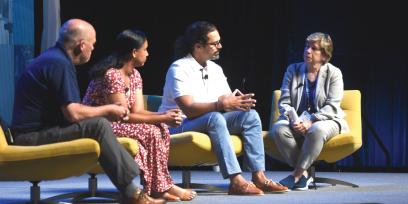Healthcare is part of the DNA and the soul of this union. That’s why AFT Nurses and Health Professionals members were in the house big-time at our convention in July. It was crucial for all of our members to hear about the shocking violence, short staffing, and lack of PPE healthcare professionals have endured. The workforce, understandably, is beyond exhausted; it’s in a mental health crisis. Hosting the panel of RNs, I could see delegates tearing up as they listened, and I could see their resolve as the panel envisioned a healthcare system that prizes patients and worker safety—not profits. Together, we can fight for and win that system. Our shared vision for an accessible, safe, well-staffed, high-quality healthcare system is set forth in the resolutions we passed at convention (which you can read about in this issue’s Union Highlights), and we won’t stop until that vision becomes reality.
How do we win? By organizing and by supporting the candidates who understand our issues and want to invest in our communities. Clinicians can’t solve healthcare’s problems alone, just like educators can’t get the resources their students need alone. But together, as I’ve been saying for years, we can accomplish what is impossible to do alone.
The AFT has organized 70 new units in the last two years, including nurses at Barrett Hospital & HealthCare in Montana, doctors at PeaceHealth United, and technicians at St. Anthony Hospital, both in Oregon, in recent months. In local after local, we’ve used our collective bargaining power to win contracts that improve care and strengthen professional voice. For example, our local at the Ohio State University Wexner Medical Center won a safe nurse-patient ratio in the operating room and in the emergency department’s critical care unit.
Having a voice at work matters, and so do elections. Just look at the changes in Public Service Loan Forgiveness (PSLF). The AFT sued Trump’s Betsy DeVos, under whom 98 percent of PSLF claims were rejected. Now, under the Biden administration, more than 175,000 people have had over $10 billion in student loan debt wiped away. And look at OSHA’s history; as Jordan Barab, a former OSHA leader, explains, far more progress has been made for worker safety under Democrats than Republicans.
But our work is just beginning. Our members knew long before COVID-19 that our healthcare system was broken. The staffing crisis is truly terrifying—for healthcare workers and patients—as RN Sherri Dayton describes. We need to elect leaders who will enact safe staffing legislation and end workplace violence. We need leaders who won’t look away when hedge fund bosses treat workers as widgets or when profit-centered hospital chains override clinicians’ expertise. We need politicians who will help us fight the corporatization of healthcare and who will join with us to rally our communities to demand quality healthcare as a right.
It’s heartbreaking that so many Americans still must choose between food and medicine when Big Pharma has made billions from vaccines (and from pushing opioids). It’s outrageous that corporate mergers are gobbling up community hospitals and closing vital programs. It’s appalling that nurses could not get new respirators, even as they held phones so COVID-19 patients could say goodbye to their families. Moral injury is now rampant among healthcare workers.*
But this November, we can elect leaders who will be our partners in these fights. We’re already turning the corner: with President Biden’s Inflation Reduction Act, America is finally lowering drug costs, helping families afford healthcare premiums, and tackling climate change. At the state level, our affiliates who have gotten out the vote have won real change, from safer staffing laws in New York to protections for community-based care in Connecticut, New Jersey, and Oregon.
Today, with help from Biden, union popularity and power are growing. Joe’s the most pro-labor, pro-working-family president since FDR—maybe ever. If we can strengthen Democrats’ control in Congress, I’m confident we’ll increase workplace safety, decrease gun violence, secure reproductive rights, and so much more. When we organize, negotiate strong contracts, partner with our communities, and elect allies up and down the ballot, look at the progress we can win.
*The AFT has partnered with researchers to better understand and address moral injury; to participate, see Moral Injury Research. (return to article)
[Photo: Michael Campbell]

